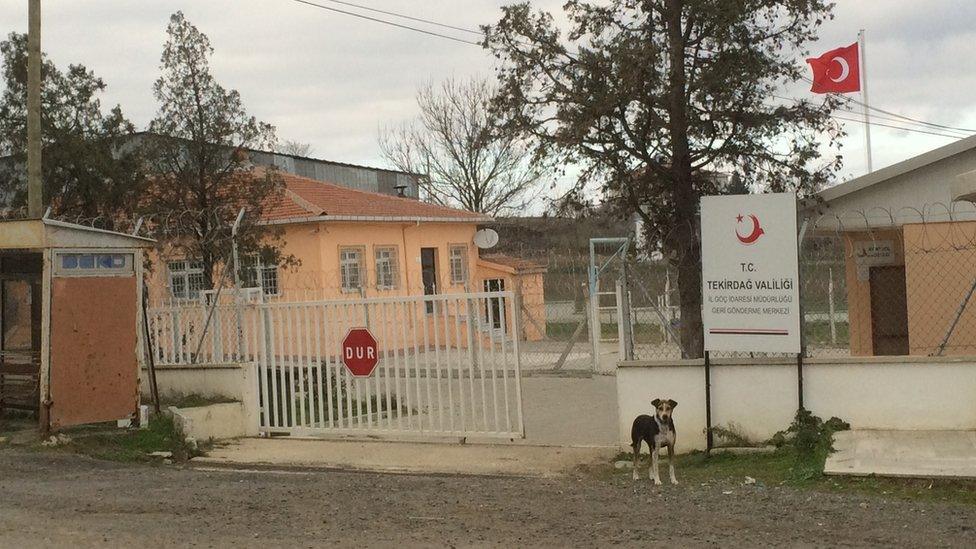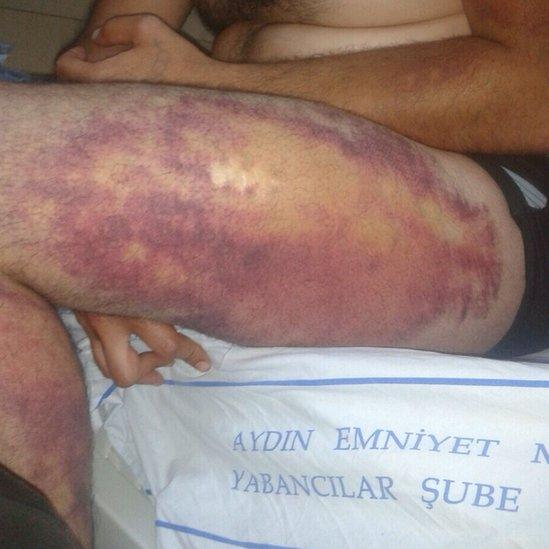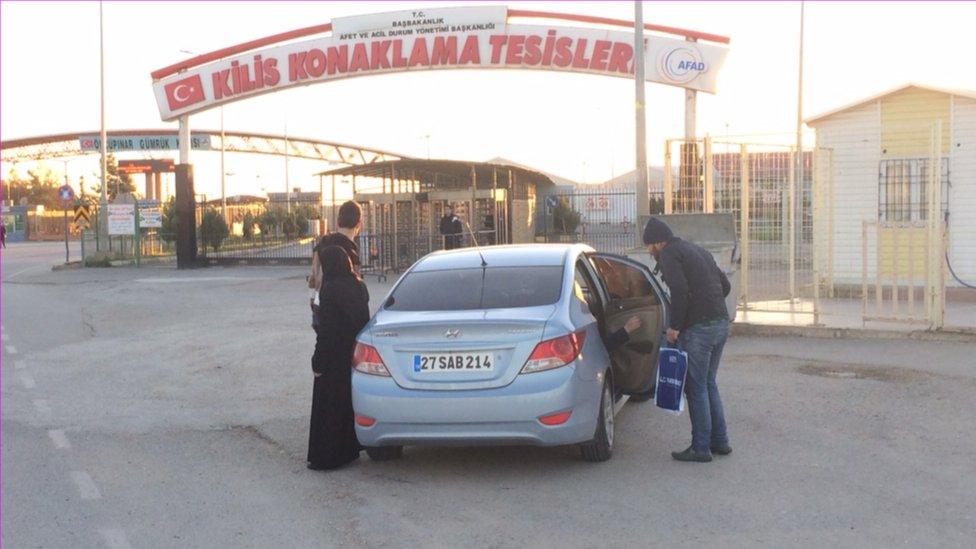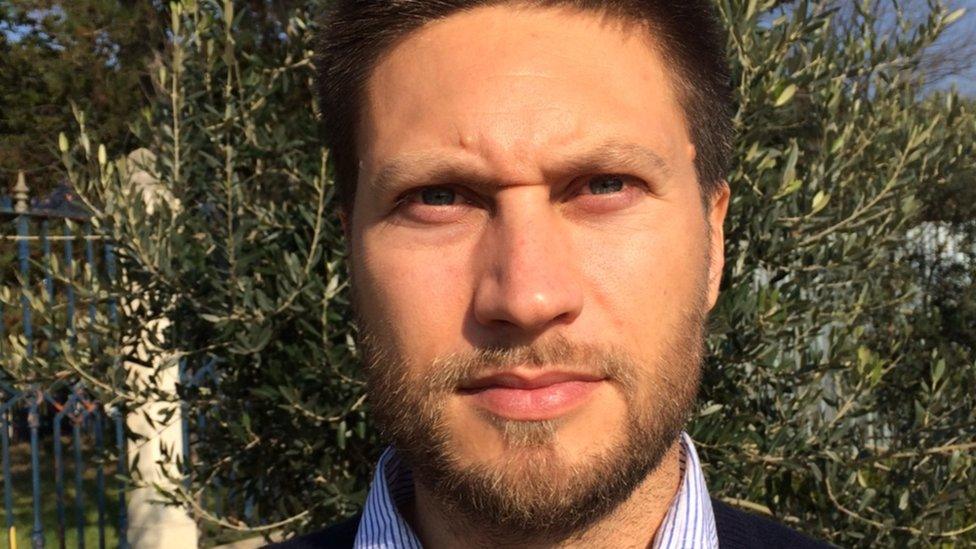Turkey 'acting illegally' over Syria refugees deportations
- Published
The BBC team met Ahmad at Tekirday detention camp
Stray dogs prowled around the entrance. The fence was topped with barbed wire. It was an icy cold morning.
"We're here to visit one of your inmates," we said. The guards took our names - but not our professions. Journalists are not allowed inside detention centres, so we went undercover.
Soon, Ahmad appeared at the gate. "Nice to see you again," he said. "You've lost weight."
We first met Ahmad in September on the Turkey-Greece border in the town of Edirne.
He was among 2,000 Syrians who had camped out at the local stadium there, trying to travel legally across the land border into Greece, rather than risking their lives in overcrowded rubber boats.
After a few days, they were cleared away by police. But not all obeyed. About 120 vowed to stay put.
'I would rather die'
Deemed "troublesome", they were rounded up by police and taken off by bus. We followed as they arrived at the local detention camp.
The policemen refused to tell us their final destination. Through the railings, dozens of inmates already there shouted from their windows, one gesturing that his arm had been broken.
Suddenly we lost the mobile phone contact that we had kept with a handful of them.
In early December, Ahmad got in touch. He was in a new detention camp, he said, in Tekirdag - a two-hour drive from Istanbul.

The Tekirdag detention centre is about a two-hour drive from Istanbul
"And what of the others?" I asked.
"They were sent back to Syria," he replied.
Under the "non-refoulement" principle of international humanitarian law, a state is prohibited from deporting individuals to a war zone.
We decided to visit Ahmad in Tekirdag to hear more of the allegations that Turkey is acting illegally.
"I was beaten badly in Edirne," he said. "They hit me."
He passed us a photograph, which shows heavy bruising on his leg. It was caused, he said, by mistreatment at the hands of the guards.

Ahmad says he was "beaten badly in detention"
After Edirne, he was taken to three other camps - in Aydin, Erzurum and now Tekirdag - with no prospect of a trial.
"I'm sitting here without charges - and I don't know how long I'll be here," he continued.
"Did the others want to go back to Syria?" I asked.
"No. I'm absolutely sure that most of them were running from Syria."
What would he do if they tried to send him back?
"I would rather die".
'Forced us to sign papers'
Two other members of the group arrested in Edirne also made contact.
One, from the Islamic State (IS) stronghold of Raqqa, messaged with the words: "We are out of prison today. They sent us to Syria.
"Bye my friend. Don't write to me until I do please," he wrote, clearly fearful of retribution by IS.
We tracked down the other to southern Turkey, where he said he had returned after being deported to Syria in late November. He showed us the Turkey exit stamp on his passport.

The border at Kilis is the one of the main crossing points between Turkey and Syria
"They drove us to the border and forced us to sign a piece of paper on which was written 'I want to go back to Syria'," he told me.
"They were shouting at us and said they would send us back to Erzurum (detention centre) if we didn't sign.
"I didn't want to go back to Syria. Some of my friends have now been put in prison there, and many people were afraid of returning to a war zone."
'Absolutely illegal'
More than two million Syrians are now in Turkey - it is the largest host of refugees in the world.
Many are settled here, glad of sanctuary. But others are using it as a transit to Europe.
Of the more than one million migrants and refugees who travelled to the European Union in 2015, most have come through Turkey.
The Turkish government has now signed a deal with the EU to receive about €3bn (£2.2bn; $3.3bn) to stem the flow.
But that is contingent on improving conditions for refugees so more feel they can stay here, not deporting them back to a war zone.

Amnesty's Andrew Gardner says sending refugees back to Syria is "absolutely illegal" both under Turkish and international law
Amnesty International says its research has found that scores - possibly hundreds - of refugees and asylum-seekers have been sent back to Syria and Iraq.
"This is absolutely illegal, both under Turkish and international law, because you cannot forcibly return someone to a place where their lives and rights are in danger," said Andrew Gardner, the head of Amnesty in Turkey.
"The EU needs to wake up to the fact that on its own borders, international law is being broken on a regular basis.
"And the EU needs to wake up to the fact that its gatekeeper in Turkey is violating the rights of refugees in detaining them secretly and arbitrarily - and returning them to Syria."
Grave charges
We asked the Turkish government for an interview. They declined, but issued this statement:
"We categorically deny that any Syrian refugees have been deported from Turkey to Syria... The UNHCR (United Nations refugee agency) interviews all returnees at the border to make sure they're going to Syria voluntarily."
When we replied, telling them our interviewees spoke of being forced to sign voluntary return papers, they replied: "To ensure public safety, individuals with criminal ties may be asked to reside at a refugee camp.
"If certain individuals would rather return to Syria… the government can't forcibly keep them in Turkey".
But Ahmad is being forcibly held in Turkey, and we have seen no evidence that the group arrested in Edirne had "criminal ties".
Being bussed between detention centres is rather different from being "asked to reside at a refugee camp".
Covert detention, deportation to a war zone: the charges are grave.
A country that has warmly and proudly welcomed so many Syrians now stands accused of illegal acts.